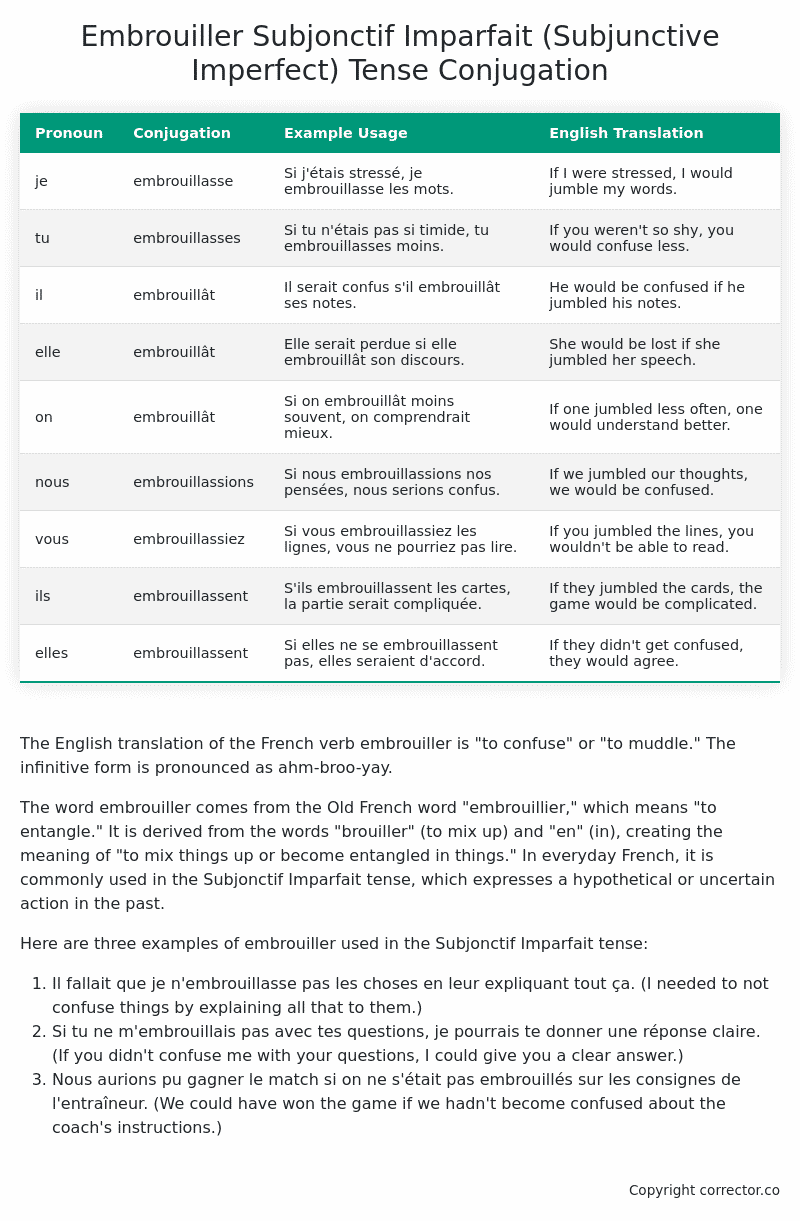Subjonctif Imparfait (Subjunctive Imperfect) Tense Conjugation of the French Verb embrouiller
Introduction to the verb embrouiller
The English translation of the French verb embrouiller is “to confuse” or “to muddle.” The infinitive form is pronounced as ahm-broo-yay.
The word embrouiller comes from the Old French word “embrouillier,” which means “to entangle.” It is derived from the words “brouiller” (to mix up) and “en” (in), creating the meaning of “to mix things up or become entangled in things.” In everyday French, it is commonly used in the Subjonctif Imparfait tense, which expresses a hypothetical or uncertain action in the past.
Here are three examples of embrouiller used in the Subjonctif Imparfait tense:
- Il fallait que je n’embrouillasse pas les choses en leur expliquant tout ça. (I needed to not confuse things by explaining all that to them.)
- Si tu ne m’embrouillais pas avec tes questions, je pourrais te donner une réponse claire. (If you didn’t confuse me with your questions, I could give you a clear answer.)
- Nous aurions pu gagner le match si on ne s’était pas embrouillés sur les consignes de l’entraîneur. (We could have won the game if we hadn’t become confused about the coach’s instructions.)
Table of the Subjonctif Imparfait (Subjunctive Imperfect) Tense Conjugation of embrouiller
| Pronoun | Conjugation | Example Usage | English Translation |
|---|---|---|---|
| je | embrouillasse | Si j’étais stressé, je embrouillasse les mots. | If I were stressed, I would jumble my words. |
| tu | embrouillasses | Si tu n’étais pas si timide, tu embrouillasses moins. | If you weren’t so shy, you would confuse less. |
| il | embrouillât | Il serait confus s’il embrouillât ses notes. | He would be confused if he jumbled his notes. |
| elle | embrouillât | Elle serait perdue si elle embrouillât son discours. | She would be lost if she jumbled her speech. |
| on | embrouillât | Si on embrouillât moins souvent, on comprendrait mieux. | If one jumbled less often, one would understand better. |
| nous | embrouillassions | Si nous embrouillassions nos pensées, nous serions confus. | If we jumbled our thoughts, we would be confused. |
| vous | embrouillassiez | Si vous embrouillassiez les lignes, vous ne pourriez pas lire. | If you jumbled the lines, you wouldn’t be able to read. |
| ils | embrouillassent | S’ils embrouillassent les cartes, la partie serait compliquée. | If they jumbled the cards, the game would be complicated. |
| elles | embrouillassent | Si elles ne se embrouillassent pas, elles seraient d’accord. | If they didn’t get confused, they would agree. |
Other Conjugations for Embrouiller.
Le Present (Present Tense) Conjugation of the French Verb embrouiller
Imparfait (Imperfect) Tense Conjugation of the French Verb embrouiller
Passé Simple (Simple Past) Tense Conjugation of the French Verb embrouiller
Passé Composé (Present Perfect) Tense Conjugation of the French Verb embrouiller
Futur Simple (Simple Future) Tense Conjugation of the French Verb embrouiller
Futur Proche (Near Future) Tense Conjugation of the French Verb embrouiller
Plus-que-parfait (Pluperfect) Tense Conjugation of the French Verb embrouiller
Passé Antérieur (Past Anterior) Tense Conjugation of the French Verb embrouiller
Futur Antérieur (Future Anterior) Tense Conjugation of the French Verb embrouiller
Subjonctif Présent (Subjunctive Present) Tense Conjugation of the French Verb embrouiller
Subjonctif Passé (Subjunctive Past) Tense Conjugation of the French Verb embrouiller
Subjonctif Imparfait (Subjunctive Imperfect) Tense Conjugation of the French Verb embrouiller (this article)
Conditionnel Présent (Conditional Present) Tense Conjugation of the French Verb embrouiller
Conditionnel Passé (Conditional Past) Tense Conjugation of the French Verb embrouiller
L’impératif Présent (Imperative Present) Tense Conjugation of the French Verb embrouiller
L’infinitif Présent (Infinitive Present) Tense Conjugation of the French Verb embrouiller
Struggling with French verbs or the language in general? Why not use our free French Grammar Checker – no registration required!
Get a FREE Download Study Sheet of this Conjugation 🔥
Simply right click the image below, click “save image” and get your free reference for the embrouiller Subjonctif Imparfait tense conjugation!

Embrouiller – About the French Subjonctif Imparfait (Subjunctive Imperfect) Tense
Formation
Common Everyday Usage Patterns
Interactions with Other Tenses
Subjonctif Présent
Indicatif Passé Composé
Conditional
Conditional Perfect
Summary
I hope you enjoyed this article on the verb embrouiller. Still in a learning mood? Check out another TOTALLY random French verb conjugation!


